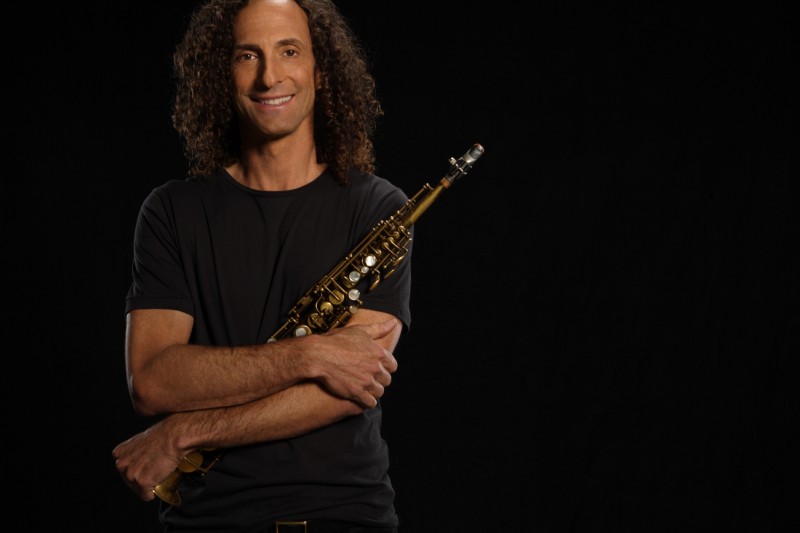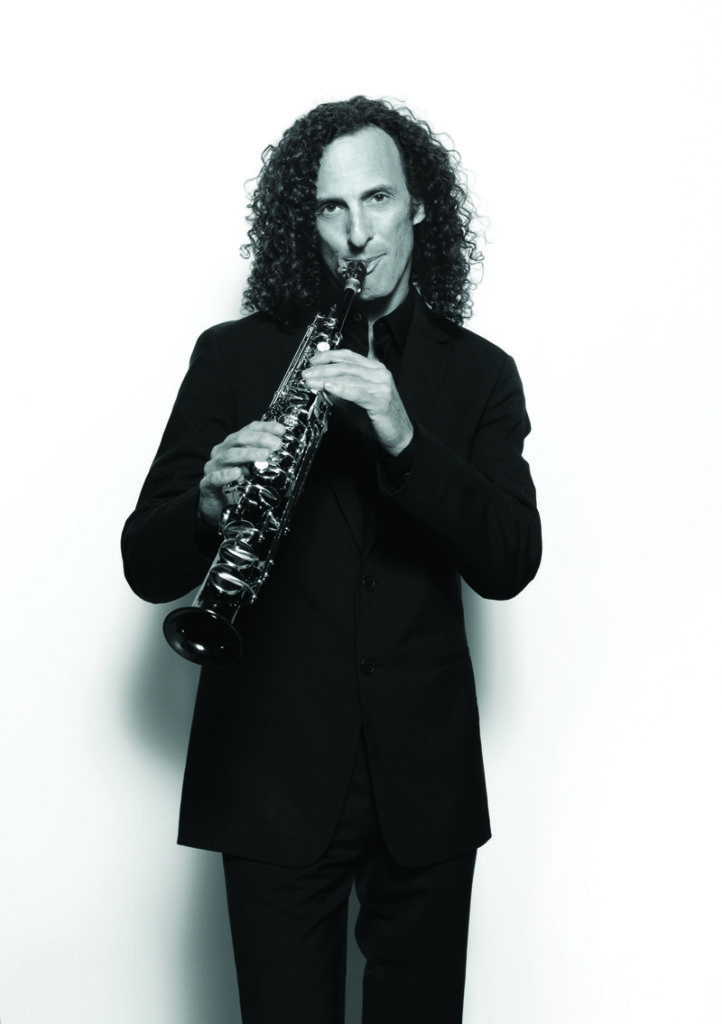
The music industry can be a fickle friend or foe. To make a living as a musician, let alone become a ‘star’ is a crapshoot at best. To be able to sustain a career as a working musician and recording artist, and be able to tour some of the best concert venues in the world, selling tens of millions of records for a prolonged period of time is nothing short of incredible.
But incredible is exactly what the career of Kenny G has been, since the gifted smooth jazz sax player broke into the public consciousness in the mid-1980s, almost single-handedly converting millions of new fans, across a wide range of ages and cultural backgrounds, into fans of jazz-infused instrumental music.
Born and raised in Seattle, Kenny’s musical journey began when he acquired his first sax at age 10, and he progressed so well at the instrument that by age 17 – while he was still in high school – he was hired as a sideman in soul legend Barry White’s Love Unlimited Orchestra. After going solo in the early 1980s, he was eventually signed to Arista Records by its legendary boss Clive Davis. His albums were immediate hits with Duotones, his fourth album, selling more than five million copies in the U.S. alone, with the single Songbird cracking the top 5 on the Billboard Hot 100 singles charts.
Since then he has continued to record and release popularly acclaimed albums, and headlining tours literally throughout the globe. His most recent album (and 18th overall) Brazilian Nights was released in 2015. At present Kenny G is wrapping up a run of Canadian dates with shows in Toronto tonight (Dec. 14) at Massey Hall and tomorrow in London at Centennial Hall.
“If you’re coming to my shows in Toronto and London you’re going to hear a lot of my music but we’re also included some nice holiday songs as well. I think it’s a nice mix – not 50/50 but there’s enough holiday music to make it fun,” he said just before hitting the stage in Hamilton.
“We tour all over the world and I would say around 70 to 75 shows a year. Right now, I am as busy as I want to be. I am hoping, though, that we will go back down to Australia at some point soon, so if we get that confirmed that would add more dates. I would like to be busier if it meant getting into new territories or getting back to places we haven’t been for a really long time. We have been around the world enough that there really aren’t any specific places I want to play still. There’s no bucket list per se. If some seriously awesome places come about, that’s great, but once you have played Carnegie Hall and the Royal Albert Hall and the Sydney Opera House, there really isn’t much out there that could be better than those venues. We are all just happy to be playing anywhere.”
Kenny believes that the key to his success over the last three decades has been his unique sound – how the ‘voice’ created by his now-iconic saxophone melodies has penetrated deep into the musical culture and continues to stand the test of time.
“Honestly, if I knew what the magic formula was I would write it down and sell it so everybody could just plug that in and have a career for 40 years. I just think what happens with certain artists is that they have a unique sound and their own style and it becomes a signature thing. If you think about Paul McCartney, we all know who Paul McCartney is and what he sounds like and we like his voice. The same could be said for Chris Martin of Coldplay – they are both instantly recognizable as soon as they start to sing,” he said.
“So, my sound is in the same category. Although I have to say, it has to be more than just being unique; you have to somehow touch people’s hearts and a lot of people have to really enjoy it and love it and want to see you play and buy your music. And fortunately for me that’s happened. When those ingredients all come together, you’re there for as long as you want to be there.
“That’s how it’s worked and I am so lucky. For whatever reason, whenever I play a saxophone it has a sound that come out of that horn that is my own sound. It’s just the way it goes, it’s not something I try to do, it is what it is. I am sure when Nat King Cole was singing he was not thinking, ‘okay I am going to try to sound different than everybody.’ He just opened his mouth and amazing stuff came out, people liked it and it became iconic. That’s kind of the way it works with me, and I am lucky that people enjoy what I do.”
The audience at a Kenny G show tends to be quite diverse, with a unique combination of long-time devotees mixing in with sax geeks looking to see one of the best in the business at his craft.
“We get young people coming to see us and I will say that when we go to Asia our audience is much, much younger than in the States, that’s just how it seems to be over there. In the States and Canada we get the high school kids who play sax who like to come out and watch and that’s great. I love talking sax with those guys,” he said.
“And then you’re going to have the older folks who have been listening to me for a long time. And in terms of backgrounds, you’ve got black, white, Hispanic, Asian – there are no barriers to this kind of music. The good thing about instrumental music is that there is no real sense of it being of a certain portion of time. It’s just melody and the way we play it and at the rhythm that we play it – all of that could be part of people’s lives no matter what their age.”
While there are millions of Kenny G fans throughout the world, and the fact that he has racked up more than 75 million album sales, Kenny has had to endure more than his fair share of slings and arrows from the jazz music establishment. Fairly or unfairly, his jazz acumen and credibility has often been questioned, but he himself just lets the criticism roll of his back.
“I am pretty sure the people are really into traditional jazz – we sometimes call them the jazz police – are not into anything but traditional jazz. I think they are where they want to be. And by the way, I love traditional jazz. When I am practising I am playing along to all the jazz greats. I am really into that music. And when you come to my shows you’re going to hear a lot of traditional jazz riffs. The problem with the jazz police is they probably never really have come to watch me play, so they don’t even know what we do at our live shows. They just think whatever they heard on the radio is all that we do. But we actually have a number of traditional jazz tunes in our set,” Kenny explained.
“Listen, they have a right to feel how they feel, I just completely disagree. And I think if you look at my history, I have done some dates with Miles Davis, Dizzy Gillespie and Sonny Rollins and when I did dates with those guys they were all happy to see me because I was bringing all these new people out to see live jazz. All of a sudden, they’re doing these jazz festivals in front of 9,000 people and a lot of those people were coming because my music was super popular and I was on the bill. So, these people not only hear me, but they’re now exposed to the genius of Miles Davis and all these amazing jazz artists for the first time.
“I really do think I was helping spread the message, but I am not sure a lot of the traditional jazz guys would look at it that way, but I do feel that’s what happened and I am proud of it. And I am proud of the way this band plays, so there’s nothing for me to be worried or upset about.”
Besides shows at the Little River Casino Resort in Manistee, Michigan on Dec. 16, the Riviera Theater in North Tonawanda, NY on Dec. 17 and wrapping up 2017 on Dec. 18 at the Strand-Capitol Performing Arts Centre in York, Pennsylvania, Kenny said he has plans to put out a new album by the summer of 2018. He is also going to be heading to Korea and other nations in the Far East later in the year.
“Something is coming out before summer next year, I just don’t know what it is yet. I will try to figure it out pretty soon, but I know the ideas will come to me and It will be really cool,” he said. For more information, visit www.kennyg.com.
· Jim Barber is a veteran award-winning journalist and author based in Napanee, ON, who has been writing about music and musicians for a quarter of a century. Besides his journalistic endeavours, he now works as a communications and marketing specialist. Contact him at jimbarberwritingservices@gmail.com.
SHARE THIS POST: